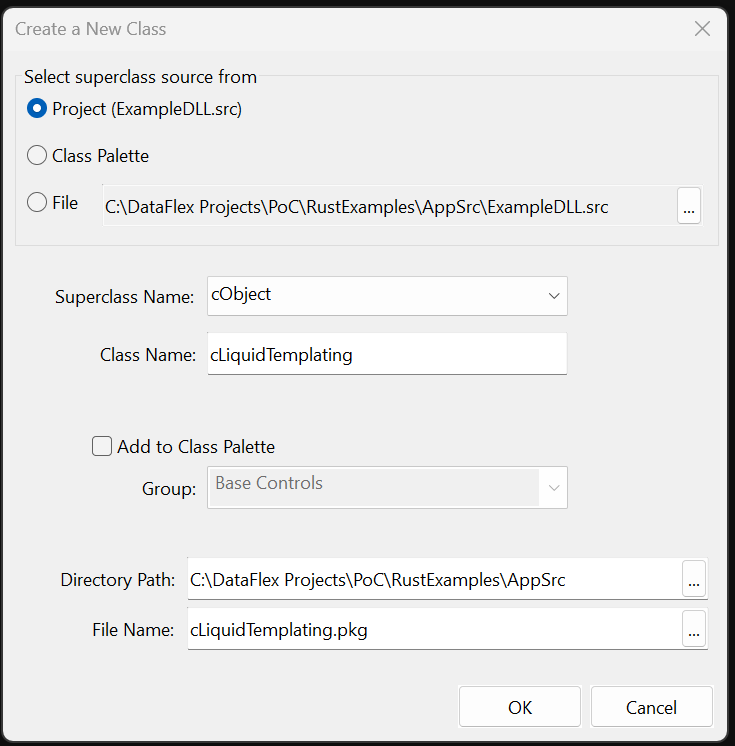DataFlex - Implementing Liquid templating by binding with Rust
The Goal
We want to create dynamic emails that end users can customize as their needs change. To do this we will need a way to offer them customisations that allow for semi complex structures and rules.
Liquid is a great templating language built by Shopify which makes formatting things like emails and other dynamic content really easy. The templating includes basic control structures and decision trees which means you can make very universal templates for a lot of conditions. These templates can then be updated on the fly as they are generally parsed each call.
The way I see the approach working is:
- Template creation is done in Dataflex. Any text entry field can handle this.
- DataFlex will create a struct of possible values that can be used on a specific template item.
- DataFlex will convert the struct to a string and pass it to a Rust Library a long with the template
- The Rust library will convert the JSON string back to a JSON object
- The Rust library will then parse the template with the JSON object using a Liquid templating engine
- Rust will return a new string that should have the correct content
- DataFLex will then handle what we use that text for
- Lets go..!
Picking a Liquid library
https://github.com/cobalt-org/liquid-rust
On the face of it, this library looks perfect. It takes a JSON object, a string, and parses the string with Liquid returning a string for the result.
let template = liquid::ParserBuilder::with_stdlib()
.build().unwrap()
.parse("Liquid! -2").unwrap();
let mut globals = liquid::object!({
"num": 4f64
});
let output = template.render(&globals).unwrap();
assert_eq!(output, "Liquid! 2".to_string());
Let’s create the DataFlex Rust binding library
cargo new --lib df-liquid
We will update the cargo.toml definition to make it a cdylib
[package]
name = "dataflex_liquid_bindings"
version = "0.1.0"
edition = "2021"
[lib]
crate-type = ['cdylib']
Then install the Liquid library
cargo add liquid
The initial proof of concept, passing in a c string
Including our helpers library:
use std::{os::raw::c_char, ffi::CStr};
pub fn get_c_string(c_s: *const c_char) -> String {
let r_string: String = unsafe {
CStr::from_ptr(c_s).to_string_lossy().into_owned()
};
return r_string;
}
mod tests {
use std::os::raw::c_char;
#[test]
fn test_characters() {
let result = super::get_c_string("testing😥".as_ptr() as *const c_char);
assert_eq!(result, "testing😥");
}
}
We can get a PoC going with
use std::{ffi::CString, os::raw::c_char};
use crate::helpers::{get_c_string};
pub mod helpers;
#[no_mangle]
pub extern fn liquidify(c_template: *const c_char) -> *mut c_char {
let owned_template = get_c_string(c_template);
let template = liquid::ParserBuilder::with_stdlib()
.build().unwrap()
.parse(owned_template.as_str()).unwrap();
let mut globals = liquid::object!({
"num": 4f64
});
let output = template.render(&globals).unwrap();
let c_result = CString::new(output).unwrap();
return c_result.into_raw();
}
mod tests {
use std::os::raw::c_char;
use crate::get_c_string;
#[test]
fn test_liquidify() {
let c_template: *const c_char = "Liquid! -2\0".as_ptr() as *const c_char;
let c_result = super::liquidify(
c_template
);
let output = get_c_string(c_result);
assert_eq!(output, "Liquid! 2")
}
}
Running tests we succeed!
PS C:\Users\Joseph.Mullins\workspace\df-liquid> cargo test
Compiling dataflex_liquid_bindings v0.1.0 (C:\Users\Joseph.Mullins\workspace\df-liquid)
Finished test [unoptimized + debuginfo] target(s) in 1.21s
Running unittests src\lib.rs (target\debug\deps\dataflex_liquid_bindings-2bcffc73adfe20ce.exe)
running 2 tests
test helpers::tests::test_characters ... ok
test tests::test_liquidify ... ok
test result: ok. 2 passed; 0 failed; 0 ignored; 0 measured; 0 filtered out; finished in 0.01s
This at least proves, that through a DLL, we can pass a template in as a c string, and that will return it parsed with some hardcoded JSON values.
JSON it up
Now let’s try get the JSON object coming in as a string.
We are going to generate this in DataFlex to ensure consistency.
Struct tJSONExample
Integer iAge
String sName
End_Struct
Procedure TestJSON
Handle hoJSON
tJSONExample example
String sJSON
Move 21 to example.iAge
Move "Joseph Mullins" to example.sName
Get Create (RefClass(cJsonObject)) to hoJson
Send DataTypeToJson of hoJson example
Set peWhiteSpace of hoJson to jpWhitespace_Spaced
Get Stringify of hoJson to sJSON
Send Destroy of hoJson
End_Procedure
This gets us
{ "iAge": 21, "sName": "Joseph Mullins" }
Let’s update our test with the new JSON input
fn test_liquidify() {
let c_template: *const c_char = "Liquid! -2 \0".as_ptr() as *const c_char;
let c_json: *const c_char = "{ \"iAge\": 21, \"sName\": \"Joseph Mullins\" }\0".as_ptr() as *const c_char;
let c_result = super::liquidify(
c_template,
c_json
);
let output = get_c_string(c_result);
assert_eq!(output, "Liquid! 19 Joseph Mullins")
}
We will add serde_json to parse the JSON
cargo add serde_json
Update the main function to handle the JSON string and parse it.
#[no_mangle]
pub extern fn liquidify(c_template: *const c_char, c_json: *const c_char) -> *mut c_char {
let owned_template = get_c_string(c_template);
let owned_json = get_c_string(c_json);
let template = liquid::ParserBuilder::with_stdlib()
.build().unwrap()
.parse(owned_template.as_str()).unwrap();
let v: serde_json::Value = serde_json::from_str(owned_json.as_str()).unwrap();
let globals = liquid::to_object(&v).unwrap();
let output = template.render(&globals).unwrap();
let c_result = CString::new(output).unwrap();
return c_result.into_raw();
}
Which makes our tests pass!
PS C:\Users\Joseph.Mullins\workspace\df-liquid> cargo test
Finished test [unoptimized + debuginfo] target(s) in 0.10s
Running unittests src\lib.rs (target\debug\deps\dataflex_liquid_bindings-9835d54a43c35fb2.exe)
running 2 tests
test helpers::tests::test_characters ... ok
test tests::test_liquidify ... ok
test result: ok. 2 passed; 0 failed; 0 ignored; 0 measured; 0 filtered out; finished in 0.00s
So besides error handling and all the niceties, we have a DLL that is a PoC we can start testing with DataFlex.
So let’s build it and start testing
cargo build --lib --release
Which places it in target/release/ as dataflex_liquid_bindings.dll
We copy that to our DataFlex project Programs directory for now.
Testing in DataFlex
Let’s create a new class and make this a little cleaner.
File -> New -> Class -> cLiquidTemplating

We will add 2 properties, psTemplate and pvData.
psTemplate will hold the template. pvData will hold a variant of the struct.
Class cLiquidTemplating is a cObject
Procedure Construct_Object
Forward Send Construct_Object
Property String psTemplate
Property Handle phData
End_Procedure
Procedure End_Construct_Object
Forward Send End_Construct_Object
End_Procedure
Function Parse Returns String
End_Function
End_Class
We will add the DLL function definition to the top of that class
External_Function _R_LiquidParse "liquidify" dataflex_liquid_bindings.dll ;
String sTemplate String sData ;
Returns String
Then we will flesh out the parse method.
We need to
- Create a JSON object
- Convert the passed struct to the JSON object
- Make the JSON a string
- Then call the library with those two strings, and get the result
First we will flesh out or parse method
Function Parse Returns String
Variant vData
Handle hoJSON
String sTemplate sJSON sResult
Get pvData to vData
Get psTemplate to sTemplate
Get Create (RefClass(cJsonObject)) to hoJson
Send DataTypeToJson of hoJson vData
Set peWhiteSpace of hoJson to jpWhitespace_Spaced
Get Stringify of hoJson to sJSON
Send Destroy of hoJson
Move (_R_LiquidParse(sTemplate, sJSON)) to sResult
Move (CString(sResult)) to sResult
Function_Return sResult
End_Function
Then we will test
Struct tBodyContent
String title
String[] products
End_Struct
Procedure TestLiquidify
tBodyContent bodyContent
String sResult
Move (InsertInArray(bodyContent.products, -1, "Apples")) to bodyContent.products
Move (InsertInArray(bodyContent.products, -1, "Pears")) to bodyContent.products
Move (InsertInArray(bodyContent.products, -1, "Oranges")) to bodyContent.products
Move (InsertInArray(bodyContent.products, -1, "Grapes")) to bodyContent.products
Object oLiquidTemplate is a cLiquidTemplating
Set psTemplate to @"
<html>
<head>
<title></title>
</head>
<body>
<ul></ul>
</body>
</html>"
Set pvData to bodyContent
End_Object
Get Parse of oLiquidTemplate to sResult
End_Procedure
Send TestLiquidify
The Result
And the output is…
<html>
<head>
<title></title>
</head>
<body>
<ul>
<li>Apples</li>
<li>Pears</li>
<li>Oranges</li>
<li>Grapes</li>
</ul>
</body>
</html>
Now let’s do one more a little more complex
Struct tProduct
String name
Number price
End_Struct
Struct tBodyContent
String title
tProduct[] products
End_Struct
Procedure TestLiquidify
tBodyContent bodyContent
tProduct product
String sResult
Move "Apples" to product.name
Move 120 to product.price
Move (InsertInArray(bodyContent.products, -1, product)) to bodyContent.products
Move "Pears" to product.name
Move 95 to product.price
Move (InsertInArray(bodyContent.products, -1, product)) to bodyContent.products
Move "Oranges" to product.name
Move 49 to product.price
Move (InsertInArray(bodyContent.products, -1, product)) to bodyContent.products
Move "Grapes" to product.name
Move 180 to product.price
Move (InsertInArray(bodyContent.products, -1, product)) to bodyContent.products
Object oLiquidTemplate is a cLiquidTemplating
Set psTemplate to @"
<html>
<head>
<title></title>
</head>
<body>
<ul>
</ul>
</body>
</html>"
Set pvData to bodyContent
End_Object
Get Parse of oLiquidTemplate to sResult
End_Procedure
Send TestLiquidify
Results in
<html>
<head>
<title></title>
</head>
<body>
<ul>
<li>Apples - 120</li>
<li>Pears - 95</li>
<li>Oranges - 49</li>
<li>Grapes - 180</li>
</ul>
</body>
</html>
Success!
tags: rust - dataflex - dll - liquid